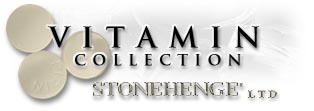| ||||||||||||||||||||||||||
| ||||||||||||||||||||||||||
 | ||||||||||||||||||||||||||

Stonehenge's first Molecular Expressions necktie line "Vitamins", was launched in September 1993 at Lord & Taylor's on 5th Avenue in New York City. This collection was Stonehenge president Irwin Sternberg's first brilliant and successful attempt at bringing together the elements of science, art, and fashion. With its initial limited-edition "Molecular Expressions Vitamin Collection" having sold out in just six months, Stonehenge, Ltd., continued its efforts to foster closer ties to science by introducing the second vitamin collection in March of 1994.
Beta-Carotene (Vitamin A) - The claims associated with this vitamin have been numerous. Vitamin A has proven to be effective as a treatment for acne, psoriasis, and night blindness. Beta-carotene is readily found in fish liver, oil, animal products, and carrots. Green vegetables, and sweet potatoes are also good sources of this vitamin.
Biotin - Biotin is necessary for both metabolism and growth in humans, particularly with reference to production of fatty acids, antibodies, digestive enzymes, and in niacin metabolism.
Cyanocobalamine (Vitamin B-12) - Cyanocobalamine is known to be essential to the health of nerve tissue. For this reason, it has been used to treat the symptoms of neurological disorders with moderate success. Smokers are especially susceptible to cyanocobalamine deficiency and this may increase their risk of lung cancer.
Folic Acid - Folic acid is a water-soluble B vitamin that takes its name from the Latin word for leaf, folium, because it was first isolated from spinach leaves.
Niacin - Niacin is a water-soluble B vitamin sometimes referred to as Niacinamide or vitamin B3. This important vitamin is abundant in nuts, beef, liver, chicken, and some fish. Recently, niacin has been demonstrated to help protect against pellagra and stress. It is also possible that niacin can act as a cancer inhibitor.
PABA - Para-aminobenzoic acid (PABA), a component of pteroylglutamate, was once considered a vitamin and named vitamin B-x because it serves as a provitamin for some bacteria. Later studies in humans demonstrated that it does not have vitamin activity because humans lack the ability to synthesize folate from PABA.
Pantothenic Acid (Vitamin B-5) - Pantothenic acid is a water-soluble B vitamin sometimes referred to as vitamin B5 or vitamin M. This important vitamin is found in broccoli, eggs, orange juice, and liver. A deficiency in pantothenic acid causes severe anemia.
Riboflavin (Vitamin B-2) - The rishest sources of riboflavin are milk, cheese, and yogurt. Individuals who exercise often, especially women, may find that they have a greater need for this important vitamin. However, claims that riboflavin may improve athletic performance have not been proven. A deficiency of riboflavin in the diet may lead to dermatitis.
Thiamine - The first recognized vitamin deficiency disease was beriberi, a condition that is manifested by numerous neurological and metabolic disorders. Sufficient thiamine in the diet is a sure cure for beriberi, a fact that was established over a long period of time through crude dietary experiments by the Chinese, Japanese, and Dutch.
Vitamin C - Citrus fruit is perhaps the best known source of this water soluable vitamin. It can also be found in green leafy vegetables, peppers and strawberries. Two-time Nobel Laureate Linus Pauling and others have claimed that vitamin C is a possible cure for the common cold and may be used as a cancer prevention agent.
Vitamin D - Vitamin D is unusual in that it can be produced in the skin from the ultraviolet rays of the sun as well as obtained from the diet. Dietetic souces include fortified milk and dairy products, liver and fatty fish. This vitamin is used to combat rickets, a childhood disease characterized by defective mineralization of the bones.
Vitamin E - Vitamin E, a fat soluble vitamin, is readily available in nuts, whole grains and vegetable and fish oils. Consumed in the correct amounts, vitamin E plays a crucial role in normal neurologic and immune system functions.
Vitamin K - Playfully termed nature's band-aid, vitamin K is most recognized for its role in preventing bleeding. Given the importance of it's function, it is easily obtained from many sources, such as: leafy vegetables, liver, cereals, dairy products, meats and fruits.
| 36246 | Questions or comments? Send us an email. |
We would like to thank our graphics and Web team for the excellent graphics and website design.
© 1995-2002 by Michael W. Davidson and The Florida State University. All Rights Reserved. No images, graphics, software, scripts, or applets may be reproduced or used in any manner without permission from the copyright holders.